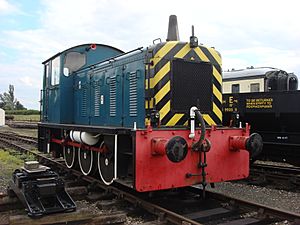British Rail Class 04 facts for kids
Quick facts for kids British Rail Class 04 |
|
 |
|
| D2298, as preserved at the Buckinghamshire Railway Centre. (NB - few examples were given any form of blue livery while in service with British Railways) |
|
| Power type | Diesel-mechanical |
|---|---|
| Builder | Drewry Car Co., at Vulcan Foundry and Robert Stephenson and Hawthorns |
| Build date | 1957–1962 |
| Configuration | 0-6-0 |
| UIC classification | C |
| Gauge | 4 ft 8 1⁄2 in (1,435 mm) |
| Wheel diameter | D2200–D2214: 3 ft 3 in (0.991 m) D2215–D2273: 3 ft 6 in (1.067 m) D2274–D2339: 3 ft 7 in (1.092 m) |
| Minimum curve | 2 chains (40 m) |
| Wheelbase | 9 ft 0 in (2.74 m) |
| Length | 26 ft 0+1⁄2 in (7.94 m) |
| Width | 8 ft 6 in (2.59 m) |
| Height | 12 ft 1+1⁄2 in (3.696 m) |
| Locomotive weight | 30.2 long tons (30.7 t) to 32 long tons (32.5 t) |
| Fuel capacity | 225 imp gal (1,020 L; 270 US gal) to 300 imp gal (1,400 L; 360 US gal) |
| Prime mover | Gardner 8L3 |
| Transmission | Wilson-Drewry 5 speed epicyclic gearbox |
| Top speed | 25 mph (40 km/h) to 27 mph (43 km/h) |
| Power output | Engine: 204 hp (152 kW) At rail: 152 hp (113 kW) |
| Tractive effort | Maximum: 16,850 lbf (75.0 kN) to 15,650 lbf (69.6 kN) |
| Train heating | None |
| Locomotive brakeforce | 14 long tons-force (139.5 kN) |
| Train brakes | Vacuum |
| Career | British Railways |
| Number | D2200–D2341 |
| Axle load class | D2200–D2214: RA 1 D2215–D2340: RA 2 |
The British Rail Class 04 was a type of small diesel locomotive. These engines were built between 1952 and 1962. They were mostly used for shunting, which means moving railway wagons and coaches around. Think of them as the busy helpers in train yards!
This class of locomotive was the starting point for the later Class 03 engines. Those were built in the workshops of British Railways.
Contents
What is a Shunter?
A shunter locomotive is like a powerful tugboat for trains. Its main job is to move railway wagons and coaches short distances. This happens in places like train yards, docks, or industrial areas. They help put trains together or take them apart.
The Class 04 had a "0-6-0" wheel arrangement. This means it had six driving wheels, all connected, and no smaller wheels at the front or back. This design was good for moving heavy loads at slow speeds.
Building the Class 04
The Class 04 locomotives were designed by the Drewry Car Co.. However, Drewry didn't have its own factories to build them. So, they hired other companies to do the actual construction.
Two main builders made these locomotives:
- Vulcan Foundry built the earlier models.
- Robert Stephenson and Hawthorns built the later ones.
In total, 142 of these useful locomotives were built. They were an important part of the British Railways fleet for many years.
Life of a Class 04
These locomotives were known for being tough and reliable. They worked hard moving goods and passenger coaches. They had a diesel engine and a special gearbox, which is why they are called "diesel-mechanical" locomotives. This system helped them deliver a lot of power for shunting.
The Class 04s could reach a top speed of about 25 to 27 miles per hour (40 to 43 km/h). This speed was perfect for their shunting duties. They weren't built for fast passenger journeys, but for heavy, slow work.
Where are they now?
Many Class 04 locomotives were eventually retired as newer, more powerful shunters were introduced. However, some have been saved and preserved. You can find these old workhorses at heritage railways and museums. They help people learn about the history of trains in Britain.
One example is D2298, which you can see at the Buckinghamshire Railway Centre. These preserved locomotives are a great way to see how trains used to operate.
Images for kids
See also
 In Spanish: British Rail Clase 04 para niños
In Spanish: British Rail Clase 04 para niños
 | Roy Wilkins |
 | John Lewis |
 | Linda Carol Brown |


